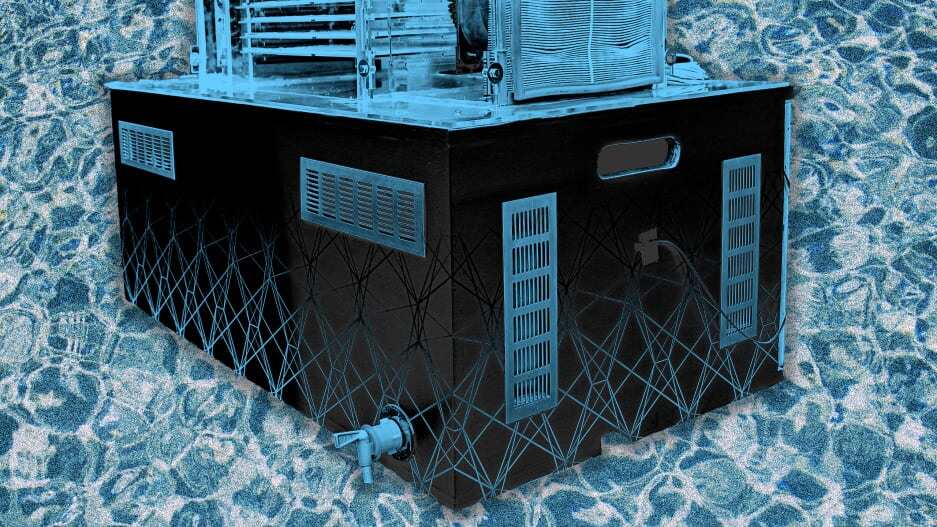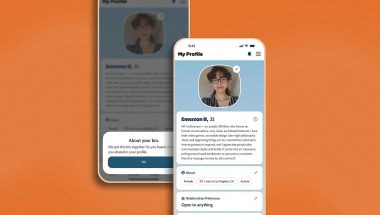- | 8:00 am
This Jordanian startup is creating water out of thin air—and training a new generation of entrepreneurs
Aquaporo started in a lab at Jordan’s Royal Scientific Society, where students helped develop water harvesting technology to possibly alleviate Jordan’s water woes.

Families in Jordan plan their day around water, scrambling to finish cooking, cleaning, and doing laundry before their water turns off. The unreliable water supply, which often flows for only 36 hours per week in urban areas, pushes Jordanians to purchase plastic tanks of water that they place on their roofs. Meanwhile, farmers resort to stealing water by digging illegal wells or siphoning water. All of this is part of a typical week in one of the world’s most water insecure countries.
As water dries up in the region and the country gulps down its supply from rivers, aquifers, and rain, many communities across Jordan are subject to water rationing and government campaigns in the past two years have urged Jordanians to limit their water use. The country’s Ministry of Water and Irrigation estimates that less than 200 cubic meters are available to each person per year—a number that the World Health Organization warns can harm human health and impede economic development. To get water, people living in cities are increasingly turning to expensive sources like bottled mineral water or truck tankers.
Amid the water shortages, Jordan’s population has risen precipitously over the past two decades—more than doubling between 2003 and 2021—and the influx of more than 1 million Syrians fleeing war is placing more strain on Jordan’s limited resources.
“Our situation—with the lack of natural resources and water—puts us in a position where we have to do something,” says Tamer Al-Salah, managing director of BeyondCapital, a venture capital firm based in Jordan that has worked with several environmental companies. “Climate entrepreneurship is important and it’s growing.”
Among the stable of companies looking to address Jordan’s water woes is Aquaporo, which has undertaken the challenge of developing an improved way to harvest potable water from the surrounding air while also helping foster a new generation of climate entrepreneurs.
Humans have been harvesting water from the atmosphere for centuries, whether through collecting dew or absorbing fog through certain types of plants. Newer technology includes advanced fog nets and dew plates. But these inventions typically only work in high-humidity regions like parts of Peru and Morocco and Jordan, though not as arid as other Middle Eastern nations, has an average annual relative humidity of roughly 50%.
Aquaporo thinks it has found a solution tailor-made for Jordan’s climate. The company’s device pushes air through nanomaterials—small pieces of plastic that contain microscopic grooves and shapes on their interior that act like strainers, capturing water vapor from the air and filtering out pollutants to produce water that is purer than Nestle’s bottled water.
Led by CEO Kyle Cordova and engineering director Husam Almassad, Aquaporo started in Cordova’s research lab at Jordan’s Royal Scientific Society. Cordova worked with a group of student trainees, whose initial design looks like a chest freezer with rows of transparent shelves stacked on top. Nanomaterials blanket each shelf, resembling thin rows of monochrome sand. In contrast, the current model is sleeker and smaller, integrating seamlessly into water coolers that most Jordanian families already have in their homes. The air conditioner-sized machine can harvest up to 35 liters of water in 20% humidity in a single day.
The Aquaporo device can produce more than double the amount of water compared with the best-performing water harvesting devices in desert climates. It also cuts down on end user costs by reducing power consumption. In a study published in Nature Communications last year, Cordova and Almassad found that the device achieved a 169% increase in water production while meeting national drinking standards. It works so well that Aquaporo’s first customer is Jordanian government, which has placed an initial order of 1,000 units, which it will provide for free to families across the country starting in January 2024. They are also in discussions with different development and aid agencies to help provide the devices to some of the most vulnerable families in Jordan and beyond.
Manufacturing will begin in Jordan, though the team is considering other locales for the future. At scale, the team aims to manufacture devices that cost around $600 USD per unit to manufacture. With support from NGOs and the Jordanian government, the team hopes to distribute the first devices free of charge. The approach is designed to help some of Jordan’s most vulnerable residents get access to drinking water while also generating acceptance for the new technology. Aquaporo is targeting cities where water insecurity is acute, including Mafraq, Tafileh, and Zarqa.
“This was a Jordanian invention, made for Jordan,” Cordova told Fast Company in his office, which is steps from the chemistry lab where students were peering through microscopes and using a computer program to mold their nanomaterials into new shapes.
Cordova’s lab benefits from a steady flow of chemistry and engineering students like Almassad, who started out as an intern at the Royal Scientific Society in 2019. In a few short years, Almassad led the mechanical engineering aspects of the device and became the engineering director for the new company.
“Since my childhood, I’ve always been obsessed with anything that has mechanical parts—toy cars, little gadgets, you name it,” Almassad told Fast Company from his office in Amman. “Now I’ve needed to change my mind from thinking like a scientist to thinking like a businessman.”
According to Almassad and Cordova, this transition from innovation to commercialization is a hurdle for Jordanian innovators and students. Compared to other Arab countries, Jordan’s population is well educated, with nearly universal literacy rates. School enrollment is high, even among women. Most students in the natural sciences, medicine, dentistry, and pharmacology are women, whereas globally, they only represent about 30% of students in STEM-related fields. But even with its skilled population, Jordanian entrepreneurship has often failed to make headwind in addressing climate change. Further, lack of communication between the private sector and STEM educators contributes to high unemployment.
“Much of Jordan’s startup ecosystem is based on digital products,” Cordova adds. “It’s because there’s not a lot of money here for capital expenditures.” Cordova’s lab operates with support from Jordan’s Princess Sumaya, whose funding helped the lab design the Aquaporo device. The lab helps students in engineering and chemistry to commercialize their ideas.
Even as they built their fledgling company, Cordova and Almassad are continuing the chain of mentorship between students and scientists. The lab currently hosts 25 students, including undergraduates who learn the nuts and bolts of the Aquaporo device. The emphasis on sharing knowledge and building skills, often present in academic settings but not in private companies, sets Cordova’s lab apart. “Young people in Jordan have great ideas,” says Cordova. “My job is to show that research can make it out of the lab.”
Al-Salah, the managing director of BeyondCapital, is eager to see more innovations from this type of entrepreneurship-via-lab approach that Aquaporo has pioneered. “If we want to encourage entrepreneurial thinking among students, we need to give them inspiration and role models,” says Al -Salah. “We need to encourage them to push their own limits.”







































